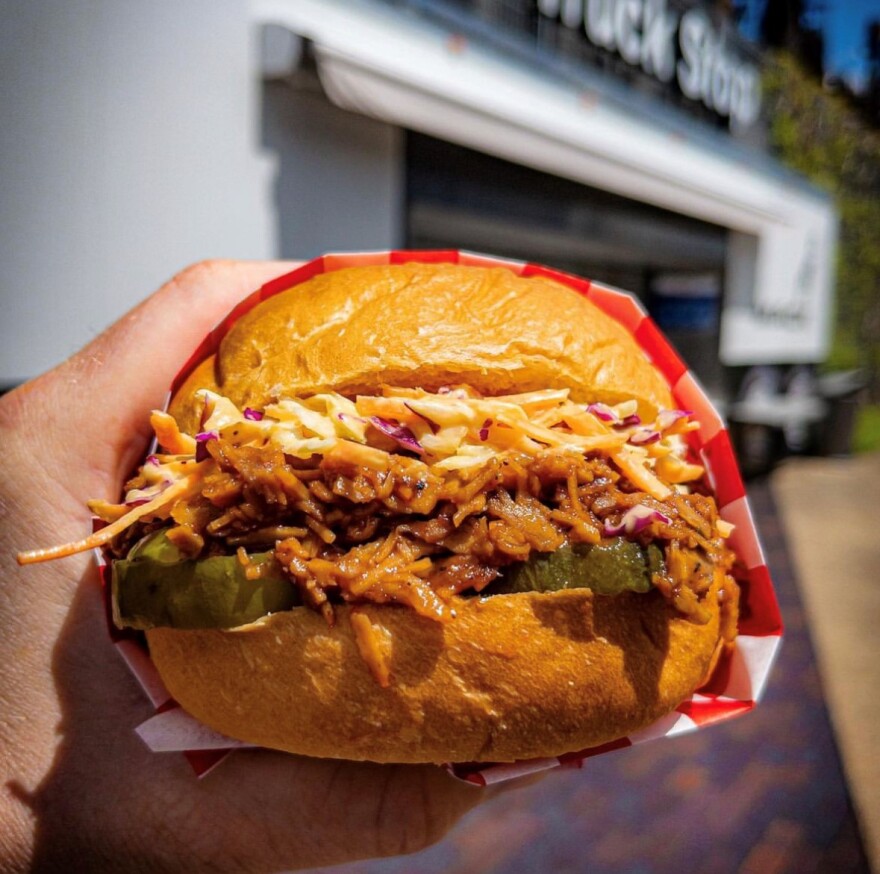LEHIGH VALLEY, Pa. — For those looking to usher in a "New Year, New You" approach, it’s as easy as ever to make a change to a compassionate, plant-based lifestyle in the Lehigh Valley with the Veganuary challenge.
At its core, Veganuary is pretty simple: It’s a one-month challenge that invites people to cut animal products — including meat, fish, dairy and other items — out of their diet.
The hope is those who try the challenge will continue with the philosophy, helping to reduce the demand for animal products across the world.
The Veganuary website launched in 2014, with millions of participants joining the movement since then.
Sandra Hungate, director of the nationwide nonprofit Veganuary, said the Veganuary challenge is a great way to introduce people to the idea of veganism in a more accessible, friendly way.
“Our contents revolves around three pillars, which are health, animals and environments," Hungate said.
"And so in all of our contents, you will see some information about all these three, because those are the three main motivators for people to try vegan."
While no diet is perfect — and there are junk-food vegans, mind you — a well-planned, whole-foods oriented vegan diet “may lower body mass index, blood pressure, HbA1C and cholesterol levels, and may also reduce the number of medications needed to treat chronic diseases,” according to a 2013 study published in the Permanente Journal.
Those who opt for veganism also help offset the effects of factory farming, one of the predominant sources of meat and dairy products throughout the world.
According to the United Nations, “switching to a plant-based diet can reduce an individual’s annual carbon footprint by up to 2.1 tons with a vegan diet or up to 1.5 tons for vegetarians.”
New Year, New You, New Skills
But the heart of the matter is the animals, Hungate said.
“There's of course the animal reason, which is the reason why Veganuary started,” she said.
“And so people really start to notice, ‘OK, this is really big… Most animals are in factory farming, and I just don't want to participate anymore.’ And so then they take that step."Sandra Hungate, director of the Veganuary nonprofit
“People just see all the cruelty, and there's also more and more documentaries online, even on Netflix," including “You Are What You Eat,” “What the Health” and “The Game Changers,” she said. "And on some of the mainstream channels.
"And so people really start to notice, ‘OK, this is really big… Most animals are in factory farming, and I just don't want to participate anymore.' And so then they take that step.”
Turning the movement into a fun challenge for a month, and supporting the idea with an interconnected community, can help lead to a bigger impact, Hungate said.
The Veganuary nonprofit conducts a survey twice a year, and has found that after six months, 28% of people who tried Veganuary stayed vegan.
An additional 50% stated they were consuming less than half the animal products they did prior to the challenge.
“And also, what we love to see is that 98% of the participants recommended Veganuary to friends and family. So people see value and they continue encouraging others to do it too."Sandra Hungate, director of the nonprofit Veganuary
“And also, what we love to see is that 98% of the participants recommended Veganuary to friends and family," Hungate said. "So people see value and they continue encouraging others to do it too."
Even if participants don’t stick with the movement completely, Hungate said a reduction in animal product consumption still is a net win.
Not a simple process
Switching over to veganism isn’t necessarily a simple process. While some people can do it easily, it can be difficult without resources and support, officials say.
Hungate said creating or joining an existing network of vegans online can be helpful — such as the Veganuary Facebook page, where “participants can go and talk to each other and find support."
In such places, people can find helpful tips about the challenges of sticking to a plant-based diet, and how to navigate social situations, such as eating at restaurants.
Even Hungate said cutting certain items, particularly cheese — which actually can be mildly addictive because of casein, a protein that triggers the brain’s opioid receptors according to hospital network Mount Sinai— can be a sizeable challenge.
That’s where things can get pretty fun.
New Year, New You, New Skills
Jason Sizemore owns and operates Butterhead Kitchen, at 4200 William Penn Highway in Bethlehem Township, which holds vegan cooking parties and produces small batch vegan products.
“People are just very surprised how much they love everything that they experienced with us, and like, being vegan isn't just tofu and beans — even though I love to cook tofu and beans,” Sizemore said with a laugh.
“It’s really fun to introduce an interest [in vegan foods], with people wanting to try new things out. Most of our guests, close to 80% to 90%, are not vegan, and they’re coming to a 100% vegan business, which is pretty cool. I love that.”
According to Sizemore, many customers are pleasantly surprised to find they enjoy plant-based dishes as much, if not more than, those with meat and dairy.
He said guests often tell him they plan to work some of his dishes into their regular culinary routine once they learn how to make them.

“I love when that happens, when they make that connection on their own," he said. "No one's shoving it on them. But that's the easiest way to weave it in.
"If you find something that is as tasty or tastier [than animal-based dishes], then it’s a no brainer."
Coming up soon, Butterhead will run a Vegan Winter Comfort Foods demo style cooking class at which participants can learn how to make plant-based foods such as spinach artichoke dip, African peanut sweet potato stew, crispy cauliflower wings, macaroni and “cheese,” chocolate bread pudding and Mayan hot chocolate.
Hungate said vegan cheese products can be pretty divisive. She said it helps to ask other vegans what products they enjoy, or if they know how to make an analogue that is cruelty free and tasty, to boot.
She said she makes a cheese substitute with cashews, nutritional yeast, herbs and spices that has impressed both family and friends when they give it a try.
Dining out in the Lehigh Valley
But sometimes you don’t really want to cook. Fortunately, the Lehigh Valley is something of a mecca for plant-based dining.
Marc Kubushefski, who runs Bethlehem-based Paranormal Pizza with his brother Joey and girlfriend Lauren Strzelecki, said he first heard of Veganuary years after he went vegan.
“I think it’s a great way for people to kind of dive head-first into a plant-based lifestyle,” Kubushefski said.
“The Lehigh Valley's got so many great vegan options all over the place, and pretty much any place you go to you can get something [vegan]. And then on top of it, there are multiple vegan restaurants.”
While Paranormal is currently without a base of operations — its restaurant burned down last year— it has been conducting popup events in its food truck throughout the Lehigh Valley, offering up “pulled pork” sandwiches and seitan-based wings.

Kubushefski said his family adores Cumin N Eat, an Indian restaurant in South Whitehall Township's Dorneyville Shopping Center, along with Bedhead Vegan Brunch House in Bethlehem.
He said he’s also eagerly anticipating the return of Veg Out, a Bethlehem staple for indulgent, over-the-top fast food with a vegan bent.
Vegan dessert
Speaking of indulgent, those searching for dessert need look no further than Vegan Treats, which has been a hallmark of the vegan scene for years now.
Beyond the cakes, cookies, doughnuts and specialty candies, it also doles out specialty soft-serve with a rotating selection of flavors. This weekend’s featured flavors are chocolate and speculoos.
Kubushefski said he encourages people to give veganism a shot, even if just for Veganuary, and see how it goes. He said he’s heard from people who have reported improved health, and a fresh mindset when it comes to the connection they have with their food overall.
“I think there's a huge disconnect when it comes to the things people put in their mouth, and what they actually see in the real world,” Kubushefski said.
“Most kids, I don't think, make the connection of what a hamburger is, or a steak is, until they're much older. And if they learned it at a younger age, I think it would probably get some kids to not want to eat meat in the first place.”
As Hungate puts it, it’s the personal connection that often help facilitate a move toward more plant-based eating and compassion.
“It's usually just little things like that, where I just tried to ask them questions and be their coach, you know, just be the vegan friend in their lives,” Hungate said.


